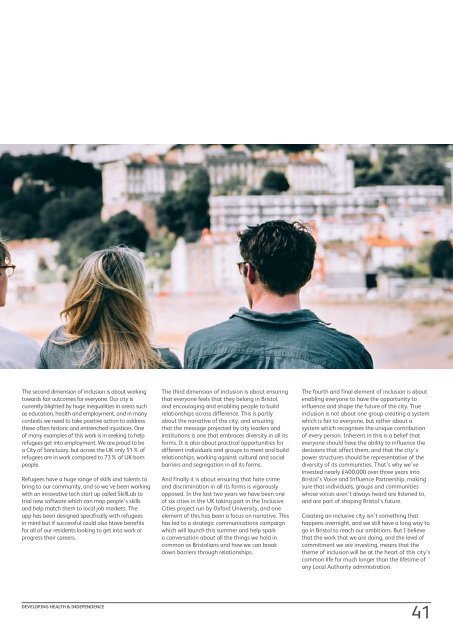The Vision Project
Throughout 2019, Developing Health & Independence (DHI), have been marking their 20th anniversary as a charity by looking to the future. Through articles, events and podcasts, they've asked people to answer the question of how we can achieve their vision of ending social exclusion. This collection of articles includes the contributions of experts from across public life and the political spectrum.
Throughout 2019, Developing Health & Independence (DHI), have been marking their 20th anniversary as a charity by looking to the future. Through articles, events and podcasts, they've asked people to answer the question of how we can achieve their vision of ending social exclusion. This collection of articles includes the contributions of experts from across public life and the political spectrum.
You also want an ePaper? Increase the reach of your titles
YUMPU automatically turns print PDFs into web optimized ePapers that Google loves.
<strong>The</strong> second dimension of inclusion is about working<br />
towards fair outcomes for everyone. Our city is<br />
currently blighted by huge inequalities in areas such<br />
as education, health and employment, and in many<br />
contexts we need to take positive action to address<br />
these often historic and entrenched injustices. One<br />
of many examples of this work is in seeking to help<br />
refugees get into employment. We are proud to be<br />
a City of Sanctuary, but across the UK only 51% of<br />
refugees are in work compared to 73% of UK-born<br />
people.<br />
Refugees have a huge range of skills and talents to<br />
bring to our community, and so we’ve been working<br />
with an innovative tech start up called SkillLab to<br />
trial new software which can map people’s skills<br />
and help match them to local job markets. <strong>The</strong><br />
app has been designed specifically with refugees<br />
in mind but if successful could also htave benefits<br />
for all of our residents looking to get into work or<br />
progress their careers.<br />
<strong>The</strong> third dimension of inclusion is about ensuring<br />
that everyone feels that they belong in Bristol,<br />
and encouraging and enabling people to build<br />
relationships across difference. This is partly<br />
about the narrative of the city, and ensuring<br />
that the message projected by city leaders and<br />
institutions is one that embraces diversity in all its<br />
forms. It is also about practical opportunities for<br />
different individuals and groups to meet and build<br />
relationships, working against cultural and social<br />
barriers and segregation in all its forms.<br />
And finally it is about ensuring that hate crime<br />
and discrimination in all its forms is vigorously<br />
opposed. In the last two years we have been one<br />
of six cities in the UK taking part in the Inclusive<br />
Cities project run by Oxford University, and one<br />
element of this has been a focus on narrative. This<br />
has led to a strategic communications campaign<br />
which will launch this summer and help spark<br />
a conversation about all the things we hold in<br />
common as Bristolians and how we can break<br />
down barriers through relationships.<br />
<strong>The</strong> fourth and final element of inclusion is about<br />
enabling everyone to have the opportunity to<br />
influence and shape the future of the city. True<br />
inclusion is not about one group creating a system<br />
which is fair to everyone, but rather about a<br />
system which recognises the unique contribution<br />
of every person. Inherent in this is a belief that<br />
everyone should have the ability to influence the<br />
decisions that affect them, and that the city’s<br />
power structures should be representative of the<br />
diversity of its communities. That’s why we’ve<br />
invested nearly £400,000 over three years into<br />
Bristol’s Voice and Influence Partnership, making<br />
sure that individuals, groups and communities<br />
whose voices aren’t always heard are listened to,<br />
and are part of shaping Bristol’s future.<br />
Creating an inclusive city isn’t something that<br />
happens overnight, and we still have a long way to<br />
go in Bristol to reach our ambitions. But I believe<br />
that the work that we are doing, and the level of<br />
commitment we are investing, means that the<br />
theme of inclusion will be at the heart of this city’s<br />
common life for much longer than the lifetime of<br />
any Local Authority administration.<br />
DEVELOPING HEALTH & INDEPENDENCE<br />
41




